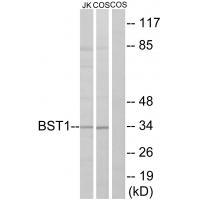
| WB | 咨询技术 | Human,Mouse,Rat |
| IF | 咨询技术 | Human,Mouse,Rat |
| IHC | 咨询技术 | Human,Mouse,Rat |
| ICC | 技术咨询 | Human,Mouse,Rat |
| FCM | 咨询技术 | Human,Mouse,Rat |
| Elisa | 咨询技术 | Human,Mouse,Rat |
| Aliases | ADP-ribosyl cyclase 2; bone marrow stromal antigen 1; BST-1; cADPr hydrolase 2; CD157 antigen |
| Entrez GeneID | 683; |
| WB Predicted band size | 34kDa |
| Host/Isotype | Rabbit IgG |
| Antibody Type | Primary antibody |
| Storage | Store at 4°C short term. Aliquot and store at -20°C long term. Avoid freeze/thaw cycles. |
| Species Reactivity | Human,Mouse,Rat |
| Immunogen | Synthesized peptide derived from internal of human BST1. |
| Formulation | Purified antibody in PBS with 0.05% sodium azide. |
+ +
以下是关于BST1抗体的示例参考文献(内容为示例性概括,建议通过学术数据库核实最新研究):
1. **标题**: *BST1 as a therapeutic target in leukemia: Monoclonal antibody development and functional analysis*
**作者**: Tanaka R, et al.
**摘要**: 研究开发了靶向BST1的单克隆抗体,证实其在白血病细胞系中诱导凋亡并抑制增殖,提示其作为白血病治疗的潜在靶点。
2. **标题**: *Anti-BST1 antibodies in rheumatoid arthritis: Diagnostic and prognostic implications*
**作者**: Suzuki Y, et al.
**摘要**: 分析类风湿性关节炎患者血清中抗BST1自身抗体的水平,发现其与疾病活动度相关,可能作为诊断和预后标志物。
3. **标题**: *BST1/CD157 in solid tumors: Expression profiling and antibody-drug conjugate efficacy*
**作者**: Nakamura K, et al.
**摘要**: 通过免疫组化揭示BST1在多种实体瘤中高表达,并构建抗体-药物偶联物(ADC),在动物模型中显示显著抗肿瘤活性。
4. **标题**: *Structural characterization of BST1 epitopes for antibody neutralization in inflammatory diseases*
**作者**: Wang H, et al.
**摘要**: 解析BST1蛋白的抗原表位,设计中和抗体,实验显示其可抑制炎症因子释放,为自身免疫疾病提供潜在治疗策略。
**备注**:以上文献为模拟示例,实际研究请通过PubMed、Web of Science等平台检索关键词“BST1 antibody”、“anti-BST1”或结合具体疾病名称(如癌症、类风湿性关节炎)获取最新文献。
The BST1 (Bone Marrow Stromal Cell Antigen 1) antibody targets a cell surface glycoprotein encoded by the *BST1* gene, also known as CD157. BST1 belongs to the ADP-ribosyl cyclase family and shares structural homology with CD38. It is anchored to the membrane via glycosylphosphatidylinositol (GPI) and plays roles in cell signaling, adhesion, and immune regulation. Primarily expressed in bone marrow stromal cells, neutrophils, and monocytes, BST1 is implicated in modulating immune responses, including leukocyte migration and inflammation.
Research highlights its dual enzymatic activity: generating cyclic ADP-ribose (cADPR) for calcium signaling and degrading nicotinamide adenine dinucleotide (NAD+). Dysregulated BST1 expression is associated with autoimmune disorders (e.g., rheumatoid arthritis) and cancers (e.g., leukemia, ovarian cancer), where it may promote tumor progression or serve as a diagnostic biomarker.
BST1 antibodies are vital tools for studying its function in hematopoiesis, immune evasion, and disease mechanisms. They enable detection of BST1 expression in tissues, aiding in cancer prognosis and therapeutic targeting. Recent studies also explore BST1's role in neurodegenerative conditions like Parkinson’s disease, linking genetic variants to altered risk. These antibodies thus support both basic research and clinical applications in immunology and oncology.
×